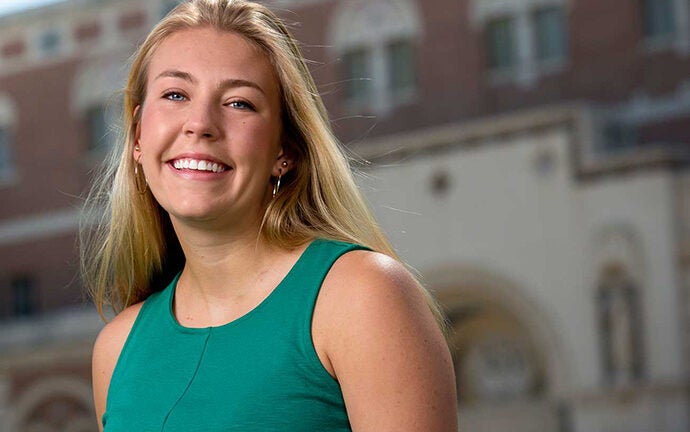
Salutatorian Amanda Semler dives into a future in marine science
Amanda Semler lives and breathes marine science. While at USC Dornsife, she’s gone scuba diving off Palau and Madagascar, been an educational diver at an L.A. aquarium and helped researchers by doing fieldwork under water.
And even though she gives off the vibe she’s been in the water forever, it’s actually USC that introduced her to her passion.
“I was from a landlocked state. I never thought about the ocean as a system before,” Semler said, a double major in geological sciences and environmental studies and one of this year’s two salutatorians. “It’s more than a body of water with salt in it. It’s a living breathing thing.”
Go west
Semler is Minnesota girl, raised in Minneapolis. She remembers visiting USC for the first time — leaving snow on the ground back home for the harsh L.A. winter (temperatures in the 60s).
It’s hard to come here and not see yourself in this environment.
Her parents, both bankers, worked long hours — sometimes up to 100 hours a week — but they’d make time to take her and her sister camping at Boundary Waters, a wilderness area on the Canadian border where waterways are shaped by steep cliffs and forest.
“It’s one of my favorite places in the world,” she said.
Those visits cultivated her love of nature and made her realize she wanted her job to be not just a paycheck, but a passion.
It was time spent studying on Catalina Island her freshman year that cemented her interest in marine science, she said. At USC’s Wrigley Marine Science Center, she got hands-on with her studies, scuba diving down to research the cove and create an underwater map. She was certified as a diver through USC.
“That sort of started me off on this whole journey,” she said. “That’s something I couldn’t do anywhere else.”
Study on
Semler will continue her studies at Stanford University in the fall, where she’s starting a Ph.D. program in earth systems science, focusing on the microbiology of the deep ocean — a place she feels is teeming with important information about our world, such as climate.
“We know more about certain parts of outer space than we do the deep ocean,” she said.
She hopes to eventually help sculpt environmental policy, which she thinks is an issue more millennials need to jump on.
“Maybe I’m biased, but I think it’s one of the defining problems of our generation,” she said of climate change. “We’re one of the last ones able to deal with it.”